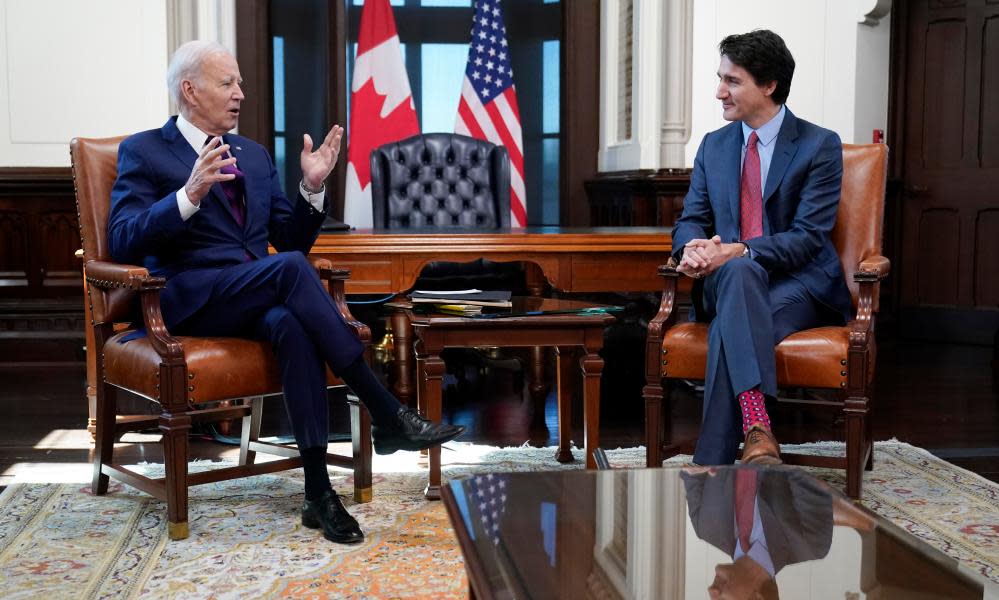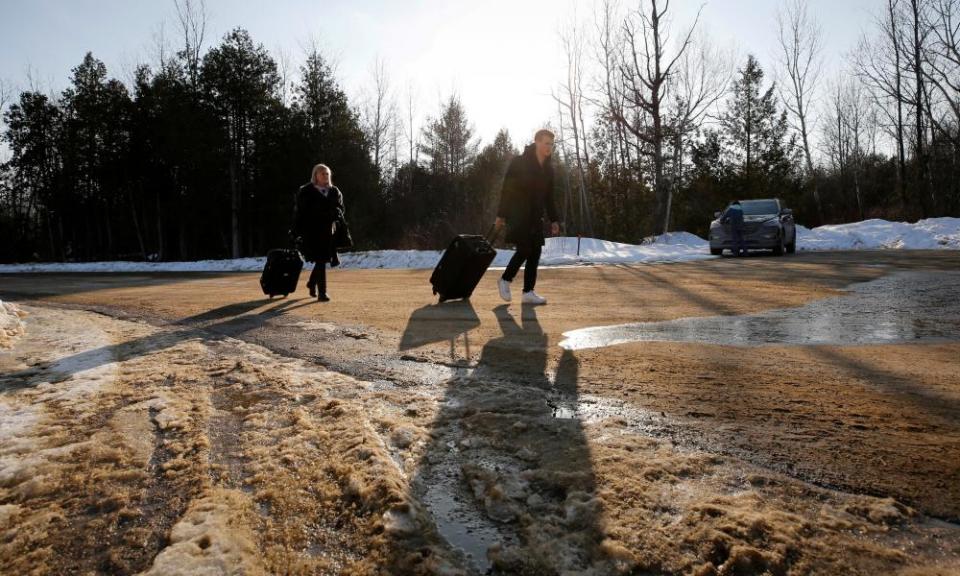Trudeau to announce US-Canada asylum deal after Biden talks

Justin Trudeau’s government has announced a major shift in how Canada and the US handle asylum claims, a move that effectively closes a controversial border crossing, after meetings in Ottawa on Friday with Joe Biden.
Under the deal, which Canadian officials hope will temper the increase in irregular border crossings in recent months, Canada will bring in 15,000 more South and Central American migrants to Canada. The prime minister’s office said in a statement the agreement would ensure more “fairness” in migration between the two countries.
The breakthrough on irregular migration was one of a handful of new policies and funding efforts announced by the two countries on Friday.
Until 2004, asylum claims could be made at any legal port of entry in Canada, where they would then be processed and claimants admitted if their claim was approved.
That changed when Ottawa successfully lobbied for the passage of the Safe Third Country Agreement, a deal that forced migrants to make asylum claims in the country where they first arrived. The current agreement applies to land-based ports of entry – but not to irregular or unofficial crossings.
In recent years, tens of thousands of migrants have circumvented the agreement and claimed asylum at unofficial points along the 5,500-mile US-Canada border. By extending the agreement to apply to the entire border, officials can now turn back migrants attempting to cross at unofficial border points.
Even though Canada pushed for the agreement in 2004, the deal has frustrated immigration officials in recent years amid a rise in asylum claims at the Quebec-New York border.
Last year, nearly 40,000 people entered Canada at Roxham Road, an informal crossing in the forests of upstate New York. In recent months, the crossing has become politically contentious, with opposition leaders and the Quebec premier calling for the crossing to be closed.

In January, Royal Canadian Mounted Police intercepted more than 5,000 asylum seekers along the road, the highest since the government started tracking the increase that began in 2017, following the election of Donald Trump as US president.
Changes to the deal only require an executive order, not congressional approval, meaning it could take effect quickly. The deal is expected to take effect just after midnight, according to the CBC’s Radio Canada.
Calls for an overhaul have also been spurred by a string of fatalities among people making irregular crossings in freezing winter weather.
But the decision to amend the agreement, which officials in the Trudeau government have been pushing for, has raised concerns that by deterring highly visible crossings, desperate asylum seekers could pursue more covert and dangerous crossings, as happens all too frequently at the US-Mexico border.
“If the Canadian government makes the agreement apply across the whole land border, they will be embarking on a job creation program for smugglers,” Audrey Macklin, a law professor at the University of Toronto, said before the announcement.
The amendment to the agreement also raises questions of enforcement.
Macklin said: “How exactly do you think you’ll patrol the thousandsof kilometres of border? Why would you do that? It would be an incalculable waste of all sorts of resources.”
American officials, who see as many as 200,000 irregular crossings at the southern US border each month, had pushed for Canada to help ease pressure on its border by helping to resettle 15,000 people.
It is unclear if those included in the quota would come through immigration, refugee or temporary foreign worker pathways. The deal is not expected to shift Canada’s current efforts to resettle 25,000 refugees this year and 29,000 by 2025.
Amnesty International condemned the decision to amend the agreement, calling it an “affront to the rights of refugee claimants seeking safety” echoing fears the move will “push migrants to attempt more dangerous crossings” into remote areas of Canada.
“It is also unconscionable that the government would take this step while the constitutionality of the agreement is under review by the supreme court of Canada,” the secretary of Amnesty International’s Canadian section, Ketty Nivyabandi, said in a statement, referring to an impending court decision on the constitutionality of the agreement itself.
In addition to a migration deal, the two leaders spoke about transitioning to clean energy, climate change and economic cooperation.
“I tell other world leaders I meet with – we’re lucky we have Canada to our north,” Biden said, calling the visit an “honour”.
The two countries also used the Ottawa visit, the first time a sitting US president has spent more than a few hours in the country in nearly two decades, to announce hundreds of millions in new funding efforts.
Canada pledged C$420m to protect the fragile ecosystems within the Great Lakes.
Under pressure from the Americans, Canada also announced C$100m in new funding for Haiti’s national police amid the Caribbean nation’s eroding political stability and security. Canada is also expected to announce plans to speed up its efforts on moderating its military hardware for the North American Aerospace Defense Command (Norad).
Later in the day, Biden addressed Canada’s parliament, speaking to lawmakers, former prime ministers and a range of other guests.
Biden praised the countries’ shared values, including those of labour unions, and decades of cooperation. He told the hundreds gathered that the two countries were “two people” that “share one heart”.
“Our destinies are intertwined and they’re inseparable,” Biden said during his 40-minute speech. “I mean this from the bottom of my heart. There is no more reliable ally, no more steady friend. And today I say to you, you will always be able to count on the United States of America.”
Biden also said the two nations were “living in an age of possibilities”, noting a planned Nasa space mission to the moon, Artemis, will consist of a Canadian alongside American astronauts.
“We’re going to write the future together,” Biden remarked.
Among those present for the speech were Michael Kovrig and Michael Spavor, Canadian nationals who were jailed by China in retaliation for their country’s arrest of Meng Wanzhou at the request of the United States. The two men were detained for more than 1,000 days.
In recent weeks, concerns over China’s interference in Canadian elections have dominated the country’s domestic politics and were a point of discussion between Biden and Trudeau.
Speaking to reporters later in the day, Biden called China the “opposition” and said his government had done to more to build global alliances than Beijing, amid concerns over renewed ties between Russia and China.

 Yahoo News
Yahoo News 
